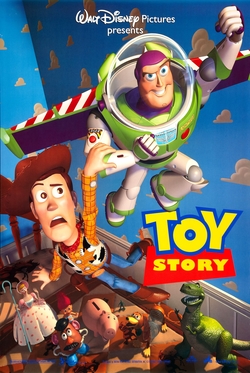
Toy Story is a 1995 American animated comedy film produced by Pixar Animation Studios for Walt Disney Pictures. The first installment in the franchise of the same name, it was the first entirely computer-animated feature film, as well as the first feature film from Pixar. It was directed by John Lasseter and produced by Bonnie Arnold and Ralph Guggenheim, from a screenplay written by Joss Whedon, Andrew Stanton, Joel Cohen, and Alec Sokolow and a story by Lasseter, Stanton, Pete Docter, and Joe Ranft. The film features music by Randy Newman, and was executive-produced by Steve Jobs and Edwin Catmull. The film features the voices of Tom Hanks, Tim Allen, Don Rickles, Jim Varney, Wallace Shawn, John Ratzenberger, Annie Potts, R. Lee Ermey, John Morris, Laurie Metcalf, and Erik von Detten.
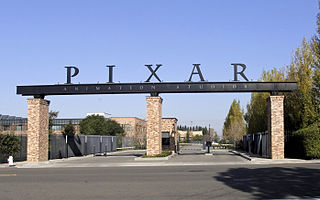
Pixar Animation Studios is an American animation studio based in Emeryville, California, known for its critically and commercially successful computer-animated feature films. Since 2006, Pixar has been a subsidiary of Walt Disney Studios, a division of Disney Entertainment, a segment of the Walt Disney Company.

Toy Story 2 is a 1999 American animated adventure comedy film produced by Pixar Animation Studios for Walt Disney Pictures. The second installment in the Toy Story franchise and the sequel to Toy Story (1995), it was directed by John Lasseter, co-directed by Ash Brannon and Lee Unkrich, and produced by Helene Plotkin and Karen Robert Jackson, from a screenplay written by Andrew Stanton, Rita Hsiao, Doug Chamberlin, and Chris Webb, and a story conceived by Lasseter, Stanton, Brannon, and Pete Docter. In the film, Woody is stolen by a toy collector, prompting Buzz Lightyear and his friends to rescue him, but Woody is then tempted by the idea of immortality in a museum. Tom Hanks, Tim Allen, Don Rickles, Jim Varney, Wallace Shawn, John Ratzenberger, Annie Potts, R. Lee Ermey, John Morris, and Laurie Metcalf reprise their roles from the first film and they are joined by Joan Cusack, Kelsey Grammer, Estelle Harris, Wayne Knight, and Jodi Benson, who play the new characters introduced in this film.
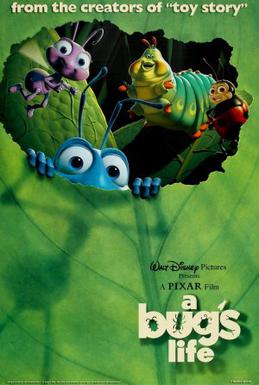
A Bug's Life is a 1998 American animated comedy film produced by Pixar Animation Studios for Walt Disney Pictures. It is Pixar's second feature-length film, following Toy Story (1995). The film was directed by John Lasseter, co-directed by Andrew Stanton, and produced by Darla K. Anderson and Kevin Reher, from a screenplay written by Stanton, Donald McEnery, and Bob Shaw, and a story conceived by Lasseter, Stanton, and Joe Ranft. It stars the voices of Dave Foley, Kevin Spacey, Julia Louis-Dreyfus, and Hayden Panettiere. In the film, a misfit ant named Flik, looks for "tough warriors" to save his ant colony from a protection racket run by a gang of grasshoppers. However, the "warriors" he brings back were a troupe of Circus Bugs. The film's plot was initially inspired by Aesop's fable The Ant and the Grasshopper.

Tin Toy is a 1988 American animated short film produced by Pixar and directed by John Lasseter. The short film, which runs for five minutes, stars Tinny, a tin one-man band toy, trying to escape from Billy, a human baby. The third short film produced by the company's small animation division, it was a risky investment: due to the low revenue produced by Pixar's main product, the Pixar Image Computer, the company was under financial constraints.

Cars is a 2006 American animated sports comedy film produced by Pixar Animation Studios and distributed by Walt Disney Pictures. The film was directed by John Lasseter, co-directed by Joe Ranft, produced by Darla K. Anderson, written by Lasseter, Ranft, Dan Fogelman, Kiel Murray, Phil Lorin, and Jorgen Klubien based on a story by Lasseter, Ranft, and Klubien, and stars an ensemble voice cast of Owen Wilson, Paul Newman, Bonnie Hunt, Larry the Cable Guy, Tony Shalhoub, Cheech Marin, Michael Wallis, George Carlin, Paul Dooley, Jenifer Lewis, Guido Quaroni, Michael Keaton, Katherine Helmond, John Ratzenberger and Richard Petty, while race car drivers Dale Earnhardt Jr., Mario Andretti, Michael Schumacher and car enthusiast Jay Leno voice themselves.

Knick Knack is a 1989 American animated short film produced by Pixar that was written and directed by John Lasseter. The short is about a snow globe snowman who wants to join the other travel souvenirs in a summer-themed party. However, the glass dome that surrounds him prevents him from doing so, thus leading to his many tries to break out of his snow globe. Knick Knack is Pixar's fourth short and the final short produced during the company's tenure as a hardware company. It was also the final Pixar short film released before the company's first feature-length film Toy Story.

Toy Story 3 is a 2010 American animated comedy-drama film produced by Pixar Animation Studios for Walt Disney Pictures. It is the third installment in the Toy Story series and the sequel to Toy Story 2 (1999). It was directed by Lee Unkrich, the editor of the first two films and the co-director of Toy Story 2, produced by Darla K. Anderson, and written by Michael Arndt, while Unkrich wrote the story along with John Lasseter and Andrew Stanton, respectively, director and co-writer of the first two films. The film's ensemble voice cast includes Tom Hanks, Tim Allen, Joan Cusack, Don Rickles, Wallace Shawn, John Ratzenberger, Estelle Harris, Jeff Pidgeon, Jodi Benson, John Morris, Laurie Metcalf and R. Lee Ermey, reprising their roles from previous films. Jim Varney, who voiced Slinky Dog in the first two films, died in 2000, 10 years before the release of the third film, so the role of Slinky was passed down to Blake Clark. The returning cast is joined by Ned Beatty, Michael Keaton, Whoopi Goldberg, Timothy Dalton, Kristen Schaal, Bonnie Hunt, and Jeff Garlin, who voice the new characters introduced in this film. In Toy Story 3, Andy Davis (Morris), now 17 years old, is going to college. Woody (Hanks), Buzz Lightyear (Allen), and the other toys are accidentally donated to Sunnyside Daycare, a daycare center, by Andy's mother (Metcalf), and the toys must decide where their loyalties lie.
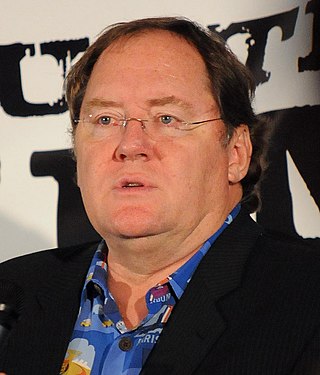
John Alan Lasseter is an American film director, producer, and animator. He has served as the Head of Animation at Skydance Animation since 2019. Previously, he acted as the chief creative officer of Pixar Animation Studios, Walt Disney Animation Studios, and Disneytoon Studios, as well as the Principal Creative Advisor for Walt Disney Imagineering.

Peter Hans Docter is an American filmmaker and animator. He was credited as the director for the Pixar animated feature films Monsters, Inc. (2001), Up (2009), Inside Out (2015), and Soul (2020), and has served as company's chief creative officer (CCO) since 2018. From his nine Academy Award nominations, he is a record-three time recipient of Best Animated Feature for Up, Inside Out and Soul. Docter has also won six Annie Awards from nine nominations, a BAFTA Children's Film Award and a Hochi Film Award. He describes himself as a "geeky kid from Minnesota who likes to draw cartoons".

Joseph Henry Ranft was an American animator, screenwriter, and voice actor. He worked for Pixar Animation Studios and Disney at Walt Disney Animation Studios and Disney Television Animation. His younger brother Jerome Ranft is a sculptor who also worked on several Pixar films.

The Princess and the Frog is a 2009 American animated musical romantic fantasy comedy film produced by Walt Disney Animation Studios and released by Walt Disney Pictures. It is inspired in part by the 2002 novel The Frog Princess by E. D. Baker, which in turn is based on the German folk tale "The Frog Prince" as collected by the Brothers Grimm. The film was directed by John Musker and Ron Clements and produced by Peter Del Vecho, from a screenplay that Clements and Musker co-wrote with Rob Edwards. The directors also co-wrote the story with the writing team of Greg Erb and Jason Oremland. The film stars the voices of Anika Noni Rose, Bruno Campos, Michael-Leon Wooley, Jim Cummings, Jennifer Cody, John Goodman, Keith David, Peter Bartlett, Jenifer Lewis, Oprah Winfrey, and Terrence Howard. Set in New Orleans during the 1920s, the film tells the story of a hardworking waitress named Tiana who dreams of opening her own restaurant. After kissing prince Naveen, who has been turned into a frog by the evil voodoo witch doctor Facilier, Tiana becomes a frog as well and must find a way to turn Naveen and herself back into humans before it is too late.

The Pixar Story, directed by Leslie Iwerks, is a documentary of the history of Pixar Animation Studios. An early version of the film premiered at the Sonoma Film Festival in 2007, and it had a limited theatrical run later that year before it was picked up by the Starz cable network in the United States.
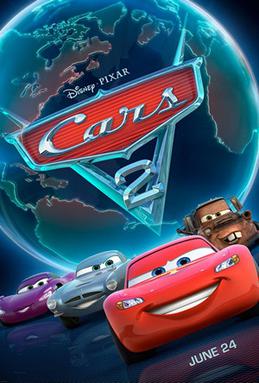
Cars 2 is a 2011 American animated spy comedy film produced by Pixar Animation Studios for Walt Disney Pictures. It is the sequel to Cars (2006), the second film in the Cars franchise, and the 12th animated film from the studio. The film was directed by John Lasseter, co-directed by Brad Lewis, produced by Denise Ream, and written by Ben Queen, Lasseter, Lewis, and Dan Fogelman. In the film's ensemble voice cast, Owen Wilson, Larry the Cable Guy, Tony Shalhoub, Guido Quaroni, Bonnie Hunt, and John Ratzenberger reprise their roles from the first film. George Carlin, who previously voiced Fillmore, died in 2008, and his role was passed to Lloyd Sherr. They are joined by newcomers Michael Caine, Emily Mortimer, John Turturro, Eddie Izzard, and Thomas Kretschmann. In the film, Lightning McQueen and Mater head overseas to compete in the World Grand Prix which promotes a new alternative fuel called Allinol, but Mater accidentally becomes involved in international espionage that could determine both his and Lightning's fate.

Cars Toons is an American animated short series based on the Cars franchise. It features Lightning McQueen, Mater, and their friends in comedic antics and adventures canonical to the films. Larry the Cable Guy reprises his role as Mater while Keith Ferguson replaces Owen Wilson as the voice of Lightning McQueen until "The Radiator Springs 500 ½", when Wilson reprises his role.

Toy Story is an American media franchise owned by The Walt Disney Company. It centers on toys that, unknown to humans, are secretly living, sentient creatures. It began in 1995 with the release of the animated feature film of the same name, which focuses on a diverse group of toys featuring a classic cowboy doll named Sheriff Woody and a modern spaceman action figure named Buzz Lightyear.

Super Rhino is a 2009 American animated comedy direct-to-video short film, produced by Walt Disney Animation Studios and starring the characters from feature film Bolt. Directed by Nathan Greno, the short film picks up sometime after the conclusion of Bolt. The excitable and TV obsessed hamster Rhino finds out his friends Penny and Bolt have been kidnapped. Rhino has to save them from the evil Dr. Calico. The short inspires Bolt: The Video Game and is a spin-off to the fictional TV show featuring Bolt.

Bolt is a fictional character that appears in Walt Disney Animation Studios' animated film Bolt (2008). He is depicted as a White Shepherd with superpowers such as a "super bark" and the ability to shoot lasers from his eyes. When he found himself lost, Bolt discovered that he was an actor in a television show, and must take it upon himself to get back home, learning how to be a normal dog in the process. Bolt's journey and personal evolution as a character are core to the film's main themes.

Dug Days is an American animated series of shorts created, written, and directed by Bob Peterson and produced by Pixar Animation Studios initially for Disney+. The series is set immediately after the 2009 film Up, following its main characters, dog Dug, voiced by Peterson, and his owner, 78-year-old Carl Fredricksen, voiced by Ed Asner in one of his last performances before his death.



















